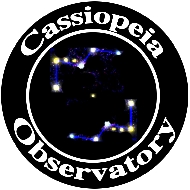 |
Last updated: 22 October 2010 |
|
|
Sent: Wednesday, October 20, 2010 18:48:22 From: Jonathan Gibbs (jonathanwgibbs@gmail.com) I have read about several different approaches to the replication of a Meade #506 RS232 cable (http://www.weasner.com/etx/autostar/2008/494cable.html) as well as adaption to bluetooth. I was wondering if it might be possible to integrate the I2C 'programming' into the software-side of an AirCable, allowing for a simplified one-piece solution to the control of a #494 based telescope.Mike here: I have my doubts but I'll let our resident AutoStar expert, Dick Seymour, chime in. From: richard seymour (rseymour@wolfenet.com) Actually, the person to ask is Gene Chimahusky (lynol1000@yahoo.com) (whom i'm CC'ing with this message) who designed and built a 506-clone (which he later expanded into a 909APM clone). As detailed here: http://home.comcast.net/~lynol1000/as_494/as494_i2c_bus.htm The trick would be to convince the AirCable to "speak" I2C bus protocol ... does it even have two bidirectional data lines? (obviously most parallel ports can be programmed thusly, but does the AirCable present those pins externally?) have fun --dick And: From: Gene Nolan (lynol1000@yahoo.com) Whats the original question? Are we talking about a bluetooth enabled 506, instead of db9 rs232 interface to a PC/MAC? Is there a reason for the 494? The 506 leaves a lot to be desired compared to what is offered in a 497. By the time you are done cobbling together a 494 with some type of 506 clone and BT you would be way past the cost of a 497 coupled with a commercial BT module, such as: www.usconverters.com/index.php?main_page=3Dproduct_info&cPath=3D65&products_id=3D228 Just feed the module 5V on pin 9 of the db9. If you are thinking about using only an Aircable SDK/devkit and all you have access to is Basic programming language you may or may not find the aircable fast enough to keep up with the AuxBus communications. Plus using an aircable SDK would be relatively expensive. What you may find easier to do is build the 506 using a PIC, only 2 resistors, PIC, oscillator and voltage regulator required (plus bypass caps). Feed -TTL- serial from an aircable into the TX/RX pins of the PIC. http://home.comcast.net/~lynol1000/as_494/as494_i2c_bus_files/image011.jpg The big chip at the bottom is not needed, it does TTL to rs232 voltage conversion. The C source code for a PIC is at the link Dick pointed to. There is also VisualBasic source code linked off the page: http://home.comcast.net/~lynol1000/as_494/as494_i2c_bus_1.htm All algorithms to receive and send across the AuxBus from a PC using a parallel port. Is the VB code perfect, no, but basic handshaking is all there. One thing, when you hook to the AuxBus, you cannot tie directly but MUST use 1k resistors. I.e. AuxClk->1k->Your unit input AuxData->1k->Your unit input. I also have on the shelf a BT module (PCB but no parts in stock) for a 100M BT module based on the RN41 with TTL serial I/O I use on my weather station and anytime I need TTL serial to BT. Here is a picture of it used as serial input to a stepper focuser controller. http://www.astrogene1000.com/products/gcusb_nstep/gcusb_nstep_files/image014.jpg The small module hanging off the wires. Couple one of these with a DIY 506 built with info on the 494 page, does not get much simpler. I do not offer 506's for sale, Meade still builds and offer these. Gene |
Go back to the Autostar Information page.
Go back to the ETX Home Page.